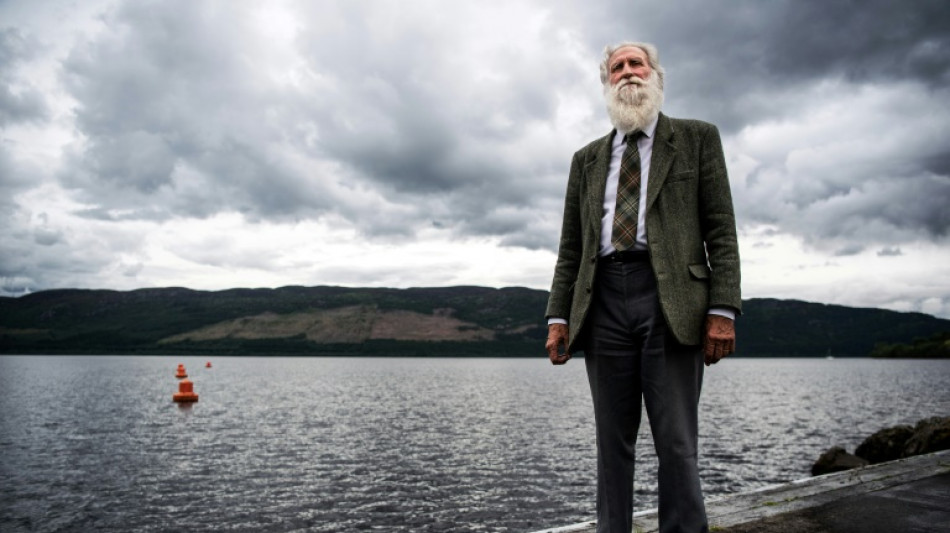
-
 Fela Kuti: first African to get Grammys Lifetime Achievement Award
Fela Kuti: first African to get Grammys Lifetime Achievement Award
-
'Schitt's Creek' star Catherine O'Hara dead at 71

-
 Curran hat-trick seals 11 run DLS win for England over Sri Lanka
Curran hat-trick seals 11 run DLS win for England over Sri Lanka
-
Cubans queue for fuel as Trump issues energy ultimatum

-
 France rescues over 6,000 UK-bound Channel migrants in 2025
France rescues over 6,000 UK-bound Channel migrants in 2025
-
Surprise appointment Riera named Frankfurt coach

-
 Maersk to take over Panama Canal port operations from HK firm
Maersk to take over Panama Canal port operations from HK firm
-
US arrests prominent journalist after Minneapolis protest coverage

-
 Analysts say Kevin Warsh a safe choice for US Fed chair
Analysts say Kevin Warsh a safe choice for US Fed chair
-
Trump predicts Iran will seek deal to avoid US strikes

-
 US oil giants say it's early days on potential Venezuela boom
US oil giants say it's early days on potential Venezuela boom
-
Fela Kuti to be first African to get Grammys Lifetime Achievement Award

-
 Trump says Iran wants deal, US 'armada' larger than in Venezuela raid
Trump says Iran wants deal, US 'armada' larger than in Venezuela raid
-
US Justice Dept releases new batch of documents, images, videos from Epstein files

-
 Four memorable showdowns between Alcaraz and Djokovic
Four memorable showdowns between Alcaraz and Djokovic
-
Russian figure skating prodigy Valieva set for comeback -- but not at Olympics

-
 Barcelona midfielder Lopez agrees contract extension
Barcelona midfielder Lopez agrees contract extension
-
Djokovic says 'keep writing me off' after beating Sinner in late-nighter

-
 US Justice Dept releasing new batch of Epstein files
US Justice Dept releasing new batch of Epstein files
-
South Africa and Israel expel envoys in deepening feud

-
 French eyewear maker in spotlight after presidential showing
French eyewear maker in spotlight after presidential showing
-
Olympic dream 'not over', Vonn says after crash

-
 Brazil's Lula discharged after cataract surgery
Brazil's Lula discharged after cataract surgery
-
US Senate races to limit shutdown fallout as Trump-backed deal stalls

-
 'He probably would've survived': Iran targeting hospitals in crackdown
'He probably would've survived': Iran targeting hospitals in crackdown
-
Djokovic stuns Sinner to set up Australian Open final with Alcaraz

-
 Mateta omitted from Palace squad to face Forest
Mateta omitted from Palace squad to face Forest
-
Djokovic 'pushed to the limit' in stunning late-night Sinner upset

-
 Tunisia's famed blue-and-white village threatened after record rains
Tunisia's famed blue-and-white village threatened after record rains
-
Top EU official voices 'shock' at Minneapolis violence

-
 Kremlin says agreed to halt strikes on Kyiv until Sunday
Kremlin says agreed to halt strikes on Kyiv until Sunday
-
Carrick calls for calm after flying start to Man Utd reign

-
 Djokovic to meet Alcaraz in Melbourne final after five-set marathon
Djokovic to meet Alcaraz in Melbourne final after five-set marathon
-
Italian officials to testify in trial over deadly migrant shipwreck

-
 Iran says defence capabilities 'never' up for negotiation
Iran says defence capabilities 'never' up for negotiation
-
UN appeals for more support for flood-hit Mozambicans

-
 Lijnders urges Man City to pile pressure on Arsenal in title race
Lijnders urges Man City to pile pressure on Arsenal in title race
-
Fulham sign Man City winger Oscar Bobb

-
 Strasbourg's Argentine striker Panichelli sets sights on PSG, World Cup
Strasbourg's Argentine striker Panichelli sets sights on PSG, World Cup
-
Jesus 'made love': Colombian president irks Christians with steamy claim

-
 IAEA board meets over Ukraine nuclear safety concerns
IAEA board meets over Ukraine nuclear safety concerns
-
Eurozone growth beats 2025 forecasts despite Trump woes

-
 Dutch PM-elect Jetten says not yet time to talk to Putin
Dutch PM-elect Jetten says not yet time to talk to Putin
-
Social media fuels surge in UK men seeking testosterone jabs

-
 Forest face Fenerbahce, Celtic draw Stuttgart in Europa League play-offs
Forest face Fenerbahce, Celtic draw Stuttgart in Europa League play-offs
-
US speed queen Vonn crashes at Crans-Montana, one week before Olympics

-
 Trump nominates former US Fed official as next central bank chief
Trump nominates former US Fed official as next central bank chief
-
New Dutch government pledges ongoing Ukraine support

-
 Newcastle still coping with fallout from Isak exit, says Howe
Newcastle still coping with fallout from Isak exit, says Howe
-
Chad, France eye economic cooperation as they reset strained ties


Loch Ness struggles with Scotland's shifting climate
Around Scotland's Loch Ness, famous for hosting a mythical monster in its murky depths, another prolonged dry spell earlier this year has heightened fears of a different kind.
The drier than usual start to 2023, alongside other gradual climate shifts, is having implications for everything from native wildlife and species -- including Scotland's famous salmon population -- to farming and power production.
"Water is becoming a commodity that's becoming scarce in this part of the world," salmon fisherman Brian Shaw told AFP during a visit early last month, as Scotland reeled from its hottest June on record.
"Everybody's looking to use the water for their own needs."
Figures released in May by the Scottish Environment Protection Agency (Sepa) confirmed what seasoned observers could already see: Loch Ness's fresh waters -- Scotland's largest by volume -- had dropped to their lowest level in decades.
It had not been this shallow -- with a depth of around 109 cms (3.5 ft) at a hydroelectric dam halfway along its eastern shore -- since the early 1990s.
"It's held at this level for several months now," Gordon Mangus, 84, who grew up near the legendary lake and now serves as its harbour master, noted.
"We are used to rain, but we are not used to having quite such dry spells."
The situation is mirrored in other Highlands areas, including Loch Maree to the northeast and Black Isle to the west.
- More dry weather -
"Everybody thinks of Scotland as a wet country, but the droughts are becoming more frequent now, as a result of climate change," explained Nathan Critchlow, the head of water and planning at Sepa.
"We used to see drought very rarely, about once every 18 years. By 2050, we predict you will have very low water levels about every other year.
"So Scotland's climate is changing and we are starting to see the impacts of that change."
On the banks of the River Ness, which flows from the loch into the sea at Inverness, the UK's northernmost city, Shaw pointed to the waterway's visible stone bed as evidence of its diminishing levels.
The director of the Ness District Salmon Fishery Board said the river's depth had been falling steadily for years, but the trend had become more noticeable.
"A dry winter, a really dry spring, a very hot June and the river just got smaller and smaller," he told AFP.
The warmer, drier weather had hit its wild salmon population, Shaw said.
One of the small streams that feeds the river has already dried up, leaving dead fish behind, he added.
"You're starting to see this sort of event happening all the time and I think there's real concern about the future of salmon and a more challenging environment as we go ahead."
While much-needed rain in recent weeks has brought some respite to parts of Scotland, water levels remain depleted to "an alert point" in some areas, according to Sepa.
And Britain's Meteorological Office is forecasting another dry period later in the summer.
- Demand for water -
Demand for water in summer is also intensifying, with more competition for it among farmers, fishermen, domestic users including tourists and hydroelectric firms, according to locals.
SSE Renewables, which runs a hydroelectric scheme at Loch Ness, has faced claims from fishermen and others that it was causing the loch's levels to drop by storing water to generate electricity.
The operator has denied that, saying the months of dry weather had depleted it.
Environmental experts are warning residents and businesses must adapt to the changing weather patterns and to prepare for periods of water scarcity and floods as the average temperature rises.
According to the Climate Change Committee (CCC), an advisory body appointed by the UK Government, Scotland's 10 warmest years on record have all occurred since 1997.
The average temperature between 2010 and 2019 was around 0.7 degrees Celsius warmer than the average between 1961 and 1990.
Wetter weather in some places has arrived in tandem with the temperature rises, mainly in winter, with the annual average rainfall between 2010 and 2019 up nine percent on 1961-1990.
At Loch Ness, before retreating back to his cabin to monitor the boats, Mangus recalled childhood memories, from entering its waters to exploring its shoreline with his father and brother.
Although the octogenarian blames the hydroelectric dam as much as the changing climate for Loch Ness's shifting water levels, he conceded that what is happening there now is "rare".
Y.Bouchard--BTB




